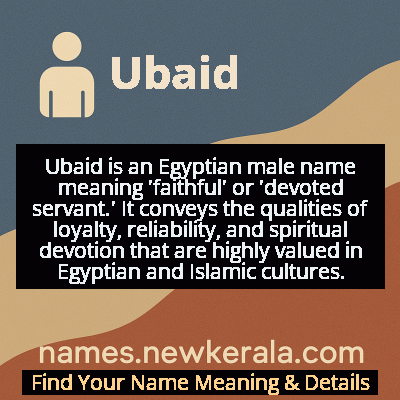Ubaid Name Meaning & Details
Origin, Popularity, Numerology Analysis & Name Meaning of Ubaid
Discover the origin, meaning, and cultural significance of the name UBAID. Delve into its historical roots and explore the lasting impact it has had on communities and traditions.
Name
Ubaid
Gender
Male
Origin
Egyptian
Lucky Number
1
Meaning of the Name - Ubaid
Ubaid is an Egyptian male name meaning 'faithful' or 'devoted servant.' It conveys the qualities of loyalty, reliability, and spiritual devotion that are highly valued in Egyptian and Islamic cultures.
Ubaid - Complete Numerology Analysis
Your Numerology Number
Based on Pythagorean Numerology System
Ruling Planet
Sun
Positive Nature
Leaders, ambitious, highly driven, self-reliant, innovative.
Negative Traits
Overly aggressive, domineering, impatient, selfish.
Lucky Colours
Red, orange, gold.
Lucky Days
Sunday.
Lucky Stones
Ruby, garnet.
Harmony Numbers
2, 3, 9.
Best Suited Professions
Entrepreneurs, managers, engineers.
What People Like About You
Courage, determination, leadership.
Famous People Named Ubaid
Ubaid Allah ibn Ziyad
Military Commander
Umayyad governor who played significant role in early Islamic expansion
Ubaid Zakani
Poet and Satirist
Renowned Persian poet known for his witty social and political commentary
Ubaid al-Qasim
Islamic Scholar
Prominent early Muslim scholar and traditionist in Baghdad
Ubaid Sinclair
Academic
Noted professor of Middle Eastern studies and cultural historian
Name Variations & International Equivalents
Click on blue names to explore their detailed meanings. Gray names with will be available soon.
Cultural & Historical Significance
Extended Personality Analysis
Individuals named Ubaid typically exhibit personality traits centered around reliability, depth of character, and steadfastness. They are often perceived as the 'rock' in their social circles—people who remain calm under pressure and provide stable support to others. Their faithfulness manifests not just in religious contexts but in all relationships and commitments, making them exceptionally trustworthy friends, partners, and colleagues. Ubaids tend to be reflective rather than reactive, considering situations thoroughly before acting, which gives them wisdom beyond their years. This contemplative nature often makes them excellent listeners and advisors. While they may not seek the spotlight, their consistent character and moral integrity earn them deep respect. Their loyalty is not blind but reasoned—once they commit to a person, principle, or cause, they demonstrate remarkable perseverance. This combination of thoughtfulness and reliability makes Ubaids natural leaders in contexts requiring wisdom and steadfastness, though they often lead through example rather than command.
Modern Usage & Popularity
In modern times, Ubaid continues to be used primarily in Muslim communities, particularly in Egypt and other Arab countries, though it remains less common than more popular Islamic names. Its usage reflects a preference for names with deep religious and cultural meaning rather than following naming trends. Among Egyptian families, it often represents a connection to both Islamic values and Egyptian heritage, serving as a meaningful choice for parents seeking a name with historical depth. The name has maintained consistent but modest popularity over recent decades, avoiding the dramatic rises and falls seen with more fashionable names. In Western countries with Muslim populations, Ubaid serves as a distinctive yet culturally grounded choice that bridges traditional values with contemporary life. Its straightforward pronunciation and spelling make it accessible across cultures while retaining its authentic character. Recent years have seen some renewed interest in traditional names like Ubaid as younger generations seek meaningful connections to their heritage.
Symbolic & Spiritual Meanings
Symbolically, Ubaid represents the profound concept of devoted service as the highest form of human expression. It embodies the metaphorical journey of being a faithful servant not just to divine will but to truth, knowledge, and community welfare. The name carries the symbolism of the foundation stone—something reliable, enduring, and essential upon which greater structures are built. In spiritual terms, it represents the ideal of submitting one's ego to higher purposes, making it a name that symbolizes humility coupled with strength. The faithful servant imagery extends metaphorically to represent stewardship—caring for others, preserving traditions, and serving future generations. In Egyptian context specifically, it symbolizes the continuity between ancient ideals of service to society and contemporary values of community responsibility. The name thus serves as a living symbol of how individual devotion contributes to collective wellbeing, making each bearer a link in a chain of faithful service stretching across generations.

